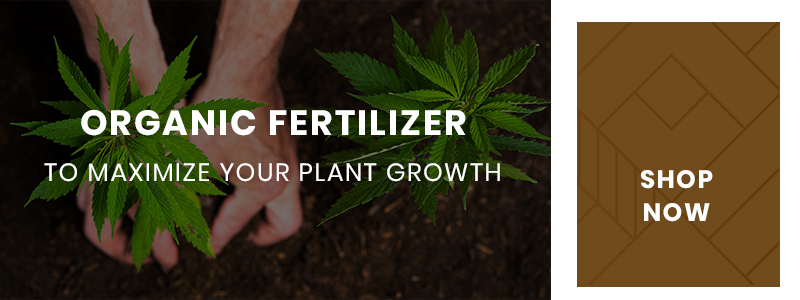What Are Essential Nutrients?
For home gardeners, especially those just getting started, one of the more challenging tasks is understanding what plants need in order to not just grow, but thrive. Some lettuce seeds may grow well enough when you simply put them in the ground and give them water and sunlight. But for many gardeners, or especially farmers who rely on a quality crop, it’s important to know what nutrients the plants need. But what are nutrients? Which ones do plants need? And what happens when plants don’t get what they need?
Just like humans get nutrients from the food we eat, plants also get nutrients from the food they eat, which can be either the sun, water, or soil. When the soil doesn’t contain the right amount or quality of nutrients, the soil can be given a fertilizer. Organic fertilizers are a great way to give plants what they need when the soil or growing medium doesn’t contain the right nutrients.
Scientists have identified 16 essential nutrients that plants need in order to grow. And when they are given the right amount of nutrients and in the right environment, they can truly thrive.
Essential Nutrients That Plants Need
There are three groups of nutrients that plants need to grow, develop, and produce flowers, fruit, or vegetables: primary, secondary, and micronutrients. In order for plants to use essential nutrients, they must be broken down into their most basic form.
- Primary: These are also known as macronutrients. Plants need these nutrients in the largest amounts and they include:
- Carbon
- Hydrogen
- Nitrogen
- Oxygen
- Phosphorous
- Potassium
- Secondary: Plants need these only in moderate amounts and they include:
- Calcium
- Magnesium
- Sulfur
- Micro: Also known as micronutrients, plants only need a small amount of these. Micronutrients include:
- Boron
- Chlorine
- Copper
- Iron
- Manganese
- Molybdenum
- Zinc
What Do They Do?
Each nutrient serves a unique function in order to help the plant grow and produce. While there are seven macronutrients, there are three that get the most attention: nitrogen (N), phosphorus (P), and potassium (K). You may have seen these letters on packages of organic fertilizer and they are simply referring to the amount of each nutrient that the fertilizer contains. We’ll take a closer look at these three nutrients:
Nitrogen
Nitrogen is an extremely important nutrient to life in general. Nitrogen is a component of chlorophyll, which is used to turn sunlight into sugars and is what gives plants their green color. Nitrogen is a component of amino acids, a building block of protein. Plants use nitrogen to conserve and release energy. And nitrogen is a component of DNA, which is what allows plants to grow and produce.
When soil or any growing medium doesn’t contain enough nitrogen, it can cause the plants to have less protein and the vegetation can be slightly yellow.
Phosphorus
Phosphorus is a component of nucleic acids, such as DNA, and is an essential part in the growth of roots and the plants themselves. Phosphorus is also used by plants to convert other nutrients into usable building blocks. Without phosphorus, plant roots would fail to develop properly, which can have a significant impact on the overall development of the plant. If the roots are unable to grow and access food and water, they cannot provide nutrients to the plants. This can eventually lead to underdeveloped flowers, fruits, and vegetables.
Potassium
Potassium plays an important role in photosynthesis and the opening and closing of a plant’s stomata, similar to a pore that allows for the exchange of gases. Potassium plays a role in water and nutrient absorption through the roots. Potassium activates essential enzyme reactions within the plant and helps a plant manage stress. Gardens or fields that are susceptible to drought, harsh winters, disease, or insects can be protected with an organic fertilizer rich in potassium.
Purchasing the Right Organic Fertilizer
The best way to determine what your plants need is to have a soil test conducted well before you start planting. A soil test will provide information on the nutrient content. With that information, you can treat the soil with fertilizer that fits its needs. However, if you’re noticing certain issues with your plants, such as appearing yellow or they are smaller than they typically should be, you can treat soil during a growing season.
Shop Gonzo Farms
Whether you have a small garden with tomatoes or roses, or you’re a commercial hemp farmer, it’s essential that soil is treated with the best organic fertilizer that will help enhance soil health, stimulate root and plant growth, and ensure high yields of healthy flowers, fruits, and vegetables. Gonzo Farms has a wide selection of organic fertilizers that harness the power of nature in order to give your plants exactly what they need to thrive. If you need to boost soil fertility, if plant roots should be stronger, or if you’re looking for healthier produce, we have a fertilizer for all of your needs.
- Raptor Roots contains beneficial bacteria and humic acids to improve nutrient and water uptake.
- Zemyna’s Elixir™ can help the development of roots.
- Enchanted Organics Bloom is a fast-acting fertilizer with a great combination of potassium and phosphorus.
- Enchanted Organics Grow is our nitrogen-rich fertilizer that offers a range of benefits for your plants.
Gonzo Farms is committed to helping everyone manage a successful garden or field that produces high-quality plants. Shop with us today and feel free to reach out with any questions.

